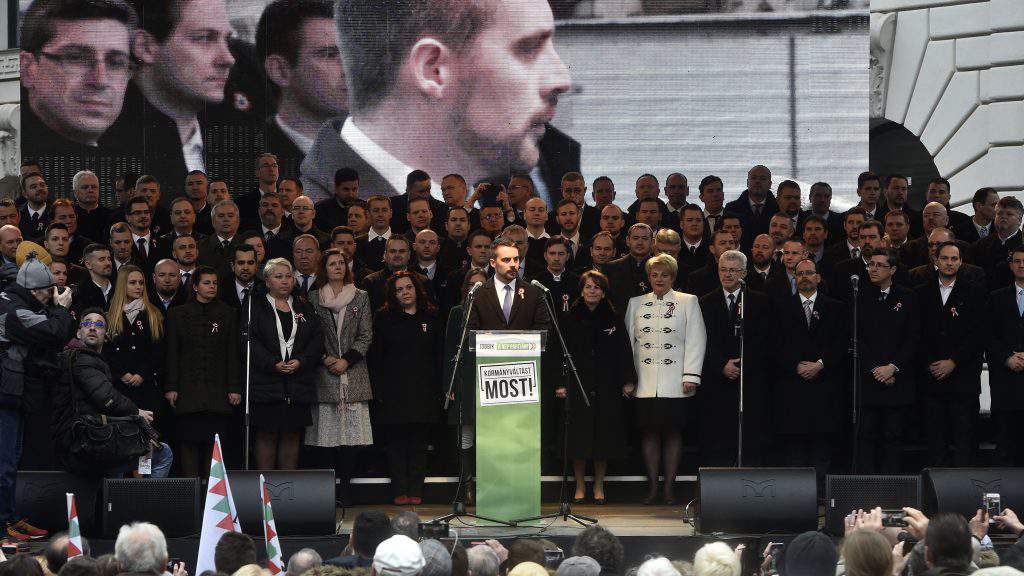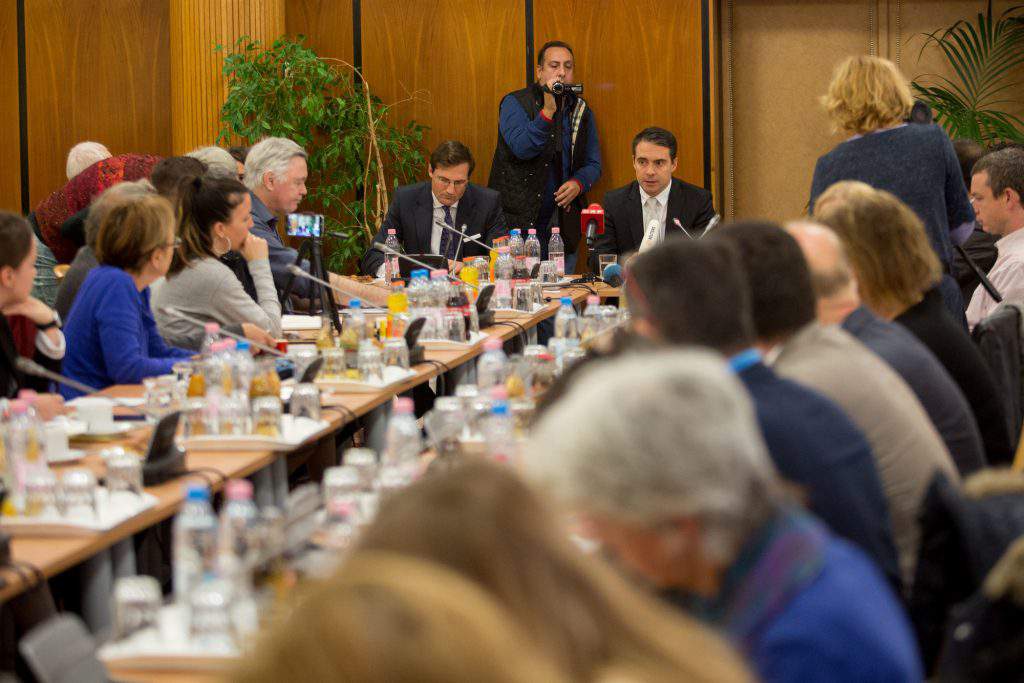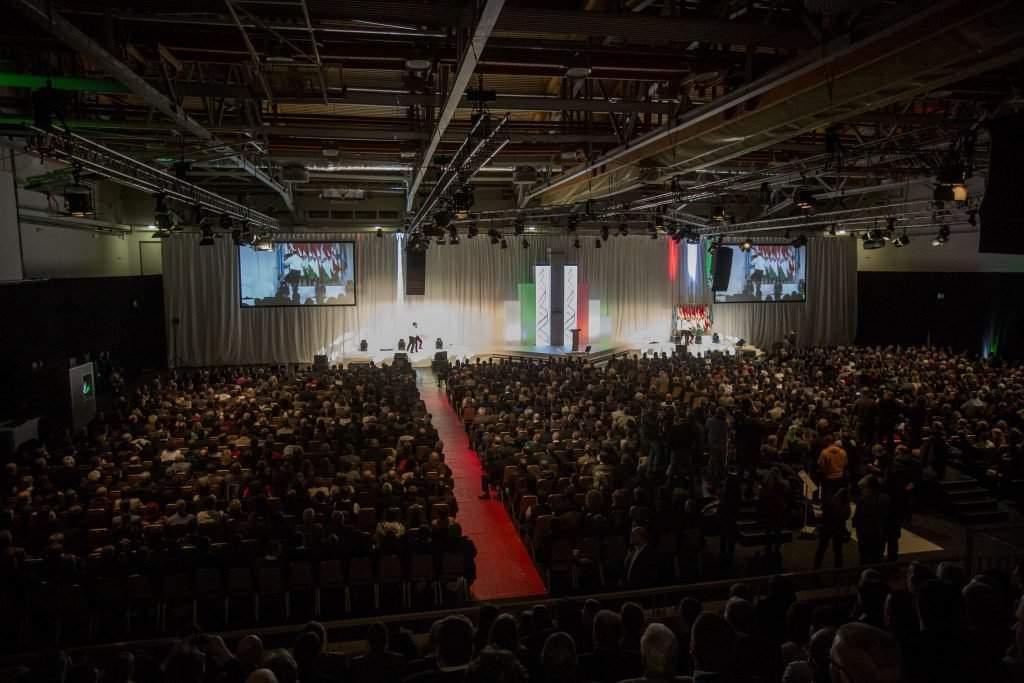“Fidesz has done a lot of things that Jobbik wanted in 2010, and we saw it first-hand how badly it turned out,” this is partly the reason why Jobbik has changed its policy, Gábor Vona explained in an interview given to hvg.hu. The top man on Jobbik’s national election list says the fate of two generations is at stake on 8th April. In the first part of hvg.hu’s interview series with the politicians heading the national lists of each party, they asked Gábor Vona about Jobbik’s responsibility, Lajos Simicska, Jews and Islam, as well as the dangers of Hungary’s isolation. We summed up the interview’s most relevant questions and answers.
The PM of 15 million Hungarians
The interview starts with a provocative question about which segment of the society Vona would particularly like to serve. In his answer, Jobbik’s leader says that he wants ‘to
promote a kind of organic social harmony
where the divides intensified and abused by the politicians of the past could be brought to a balance. ‘That is why
we want a technical government
with experts in each field so that we would trigger as few ideological disputes as possible.’ – he added.
What would he teach and to whom?
Speaking of the first 100 days Vona mentioned
establishing national minimums regarding e.g. healthcare and education.
Thus, he would start with launching a Parliamentary and social dialogue with NGOs, trade unions and other representative organisations. Speaking about the integration of Roma children, the leader of Jobbik would keep the party’s boarding school initiation. However, that would only be one option. According to Vona,
the goal is integration.

Photo: MTI
But social experience is that forced integration frequently leads to spontaneous segregation. Thus, streaming, setting differentiated education projects, these ideas are part of the relevant literature, too. Even Lívia Járóka herself, the Fidesz-delegated MEP in charge of developing a Roma strategy wrote about creating differentiated groups.
Who threatens who and who should be afraid?
According to Vona, Jobbik would join the European Public Prosecutor’s Office (EPPO). This and independent heads leading independent institutions would guarantee to hold politicians to account without a political showdown.
He stated that PM Orbán could regard his prison sentence promise said in the parliament as a threat. However, it was said in a heated political debate when he was talking about the corruption scandal of the PM in office. On the contrary,
the Prime Minister threatened part of the Hungarian society
that disagrees with him at a national celebration. Furthermore, he was reading out his pre-written speech which excludes any spontaneous outburst of anger.
Regarding independent courts, Vona highlighted that
Jobbik will do ‘whatever a government can do to ensure the freedom of the judicial system.’
Vona: ‘I feel we are ready to govern Hungary!’
Regarding former Fidesz-oligarch now one of the biggest adversary to PM Orbán, Lajos Simicska Vona said that
‘there is no area where Jobbik and I could be influenced by either Lajos Simicska or any other business lobby group.’
According to Jobbik’s PM candidate, they honestly cooperated with the State Audit Office as much as they could.
Speaking about the party’s past, he highlighted that Jobbik never was a Nazi party, and everybody should examine what Jobbik has said and done when they had to stand for democracy. ‘We were always on the good side.’ – stated Vona. He added that whatever vice president László Toroczkai says,
his position is valid. ‘Jobbik has found its purpose, voice and programme.’
Regarding other opposition parties and left-liberal PM candidate Gergely Karácsony, Vona said that he does not want to replace him.
He wants to replace PM Viktor Orbán.

Photo: Balázs Béli
Foreign policy: can isolation be avoided?
Regarding the migrant crisis, Vona cleared that
Jobbik would comply with the international treaties.
They would not dismantle the border fence, and they reject the idea of quotas. However, he stated that Jobbik would not make such propaganda out of it. Vona said that
he would go firstly to Austria or Germany on his first visit abroad.
Moreover, from the very first day, they will send the message towards the West that Hungary is a stabilising and not a de-stabilising force. Finally, Vona cleared that Jobbik never received any foreign funding and would develop the best possible relationship with the more influential countries Germany, Russia, Turkey, the USA and China. However, he does not want Hungary to become a pawn in a chess game that they play against each other.
Reestablishing democracy and creating an atmosphere of cooperation
Regarding Palestine, Jobbik supports the relevant UN Resolution as a guideline: an independent Israel and an independent Palestine. ‘We want to achieve the best possible relations with the Hungarian Jewish communities’ – he added. Thus, Vona was happy that
the head of the Hódmezővásárhely synagogue openly supported Jobbik’s candidate.
Vona highlighted that he rejects radical Islam and terrorism, but he considers each world religion an important fountain of knowledge that could be inspiring for any European Christian person.

Talking about restoring democracy, Vona mentioned that its government would show generosity, a better attitude towards society. He said that despite the radicalisation of Hungary Jobbik chose a moderate tone and stated that
we should rise above partisanship, understand and accept each other.
According to Vona, the 2018 Election will decide the fate of the generation below 40. He added that if Jobbik does not win, he will resign but
he does not want to withdraw from politics.
However, he thinks that if the government remains, more people will emigrate abroad. About a possible Jobbik government, he said that after a couple of months everybody would see that it does not pose a risk to anybody.
Photos: MTI, Balázs Béli